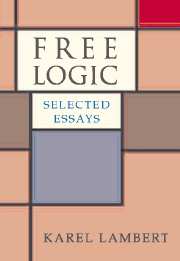Book contents
- Frontmatter
- Contents
- Introduction
- 1 Russell's Version of the Theory of Definite Descriptions
- 2 Existential Import, ‘E!’ and ‘The’
- 3 The Reduction of Two Paradoxes and the Significance Thereof
- 4 The Hilbert-Bernays Theory of Definite Descriptions
- 5 Foundations of the Hierarchy of Positive Free Definite Description Theories
- 6 Predication and Extensionality
- 7 Nonextensionality
- 8 The Philosophical Foundations of Free Logic
- 9 Logical Truth and Microphysics
3 - The Reduction of Two Paradoxes and the Significance Thereof
Published online by Cambridge University Press: 05 June 2012
- Frontmatter
- Contents
- Introduction
- 1 Russell's Version of the Theory of Definite Descriptions
- 2 Existential Import, ‘E!’ and ‘The’
- 3 The Reduction of Two Paradoxes and the Significance Thereof
- 4 The Hilbert-Bernays Theory of Definite Descriptions
- 5 Foundations of the Hierarchy of Positive Free Definite Description Theories
- 6 Predication and Extensionality
- 7 Nonextensionality
- 8 The Philosophical Foundations of Free Logic
- 9 Logical Truth and Microphysics
Summary
THE CONJECTURE
David Kaplan once suggested to me that the pair of self-contradictory statements:
(1) The round square both is and isn't a round square,
and
(2) The class of all classes not members of themselves both is and isn't a member of itself
“ought to have the same father”. But apparently they don't despite their family resemblance. Russell deduced (1) from a principle he presumed correctly to be a key ingredient of Meinong's theory of objects. That principle says:
MP The object that is so and so is (a) so and so.
On the other hand, Russell deduced (2) from a seemingly unrelated but no less fundamental principle in Frege's version of set theory, the principle of set abstraction. That principle, a version of the principle of comprehension, (in effect) says:
FP Everything is such that it is a member of the class of so and sos if and only if it is (a) so and so.
The lack of common ancestry between MP and FP, and hence between their respective consequences (1) and (2), enabled Russell to treat the theory of objects and the theory of sets (or classes) very differently. He thought (1) “demolished” the theory of objects, but he didn't think (2) destroyed the theory of classes. Russell's attitude was wrong, because Kaplan's suspicion of the common kinship of (1) and (2) is justified, and the proof of this fact is the next order of business.
- Type
- Chapter
- Information
- Free LogicSelected Essays, pp. 33 - 43Publisher: Cambridge University PressPrint publication year: 2002



